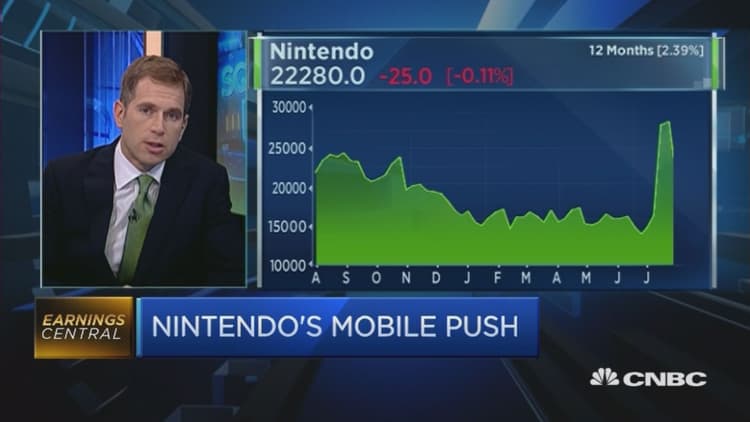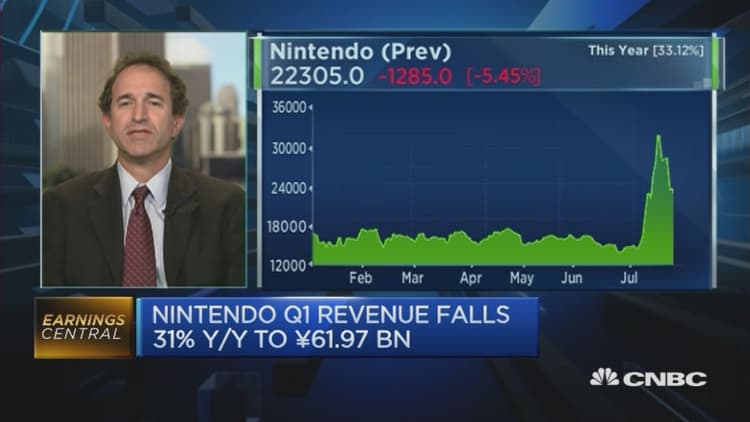


Nintendo's on the cusp of a change and the storied game maker could soon unlock the vast potential of its intellectual property in the lucrative mobile gaming space, experts told CNBC on Thursday.
At heart of the revival could be the success the company has enjoyed through its runaway hit "Pokemon Go," its second ever venture into the mobile gaming space.
The launch of "Pokemon Go" has seen investors respond with excitement. Nintendo, which owns an undisclosed stake in Niantic, the creator of the highly popular game, as well as a 32 percent stake in the Pokemon Company, saw its shares spike on anticipation that the game would boost its overall business.
Though expectations have somewhat deflated in recent weeks, as investors realized the impact of "Pokemon Go" on Nintendo's profits will be limited, Seth Fischer, chief investment officer of Hong Kong-based investment firm Oasis told CNBC the market was still betting on Nintendo fully embracing mobile as a platform.
"The phenomenon is that up until now, and even in their guidance, [Nintendo] doesn't really understand the full impact of how big mobile is and how profitable it can be for the company," Fischer said.
Fischer launched a campaign to push Nintendo into the mobile gaming space back in 2013.
In a letter to Nintendo's former CEO, the late Satoru Iwata, dated June 24, 2014, Fischer outlined a three-pronged approach on how the game-maker could change its fortunes.
The plan comprised of returning 580 billion yen ($5.53 billion) of capital to shareholders, making games available via app stores for smart devices and a clear plan of monetizing Nintendo's intellectual property.
Nintendo had long resisted the move into mobile in a bid to protect its legacy console business, before finally caving in 2015 to partner with Japanese game developer DeNA. Through that partnership, Nintendo will release five mobile games by March, 2017.
"This is great for Nintendo," Fischer told CNBC on Thursday. "They have an enormous amount of patents, about 4,000 patents; we think they can make an additional 300 - 800 million dollars a year of monetization of their mobile game [patents], as well as, multiplayer patents."
The pivot could help Nintendo as its legacy businesses continue to come under strain.
The Kyoto-based company released its first quarter earnings Wednesday, posting a 5.13 billion yen operating loss, due to falling sales and a strong Japanese yen.
In its first quarter earnings, Nintendo said worldwide sales for its handheld gaming console, 3DS, slipped 7 percent on-year to 940,000 units. Software for the 3DS also fell 7 percent on-year to 8.47 million units.
More stark was the massive drop in quarterly global sales of Wii U hardware, which fell 53 percent on-year to just 220,000 units, while software sales dropped 3 percent to 4.68 million units.
"Nintendo is moving from a hardware supplier with games to just a game company, with some hardware," Peter Boardman, managing director at Tradewinds Global Investors told CNBC. "You have seen hardware products like Wii U, 3DS and [other] handheld products falling off a cliff."
Still, Boardman added that some positive factors could help Nintendo achieve its full year operating profit forecast of 45 billion yen, such as the "Pokemon Go Plus" accessory that the company is set to sell later this year, as well as new mobile gaming titles that are due - such as Animal Crossing and Fire Emblem.
The company's North American business also sold much of its stake in Major League Baseball club Seattle Mariners earlier this year; the profitability from that sale would come through in the second half of the year, he said.
"The company has changed a lot in a couple of years ... the volatility is going to be a lot greater in the future," Boardman said, adding it could also lead to more profitability.


